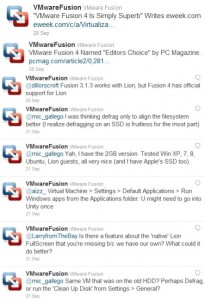
- #Vmware vs parallels for mac install
- #Vmware vs parallels for mac software
- #Vmware vs parallels for mac license
- #Vmware vs parallels for mac windows
There are two things holding me back from a full-on Workstation recommendation: first, (like Player) it's only available for Linux and Windows. For the most part, this worked during my tests, but it was slow enough that I preferred keeping the virtual machines I tested inside the single VMware client window.

#Vmware vs parallels for mac windows
So, icons and windows from a Windows VM would appear to run alongside those of a, say, Ubuntu operating system.

The Unity view tries to incorporate elements of the virtual machine directly within the interface of the native operating system. And, even for those who don't, the default settings are good enough that you can run any recognized operating system very efficiently. The setup wizard is straightforward, and intuitive enough that most users with a little technical experience under their belts can understand what's going on. I have used it on Windows and Linux machines, and have found it incredibly easy to use. But "acquiring" such an image of a Windows or OS X instance will be illegal in most places on the planet, since using an operating system without paying the appropriate licensing fees is considered theft.įor the functionality, I would really like to recommend VMware Workstation. With open source software, that's not too hard. With Player, you will have to acquire a virtual machine that's been prebuilt.
#Vmware vs parallels for mac install
This limits Player for personal use if you want to install an operating system on your own virtual image. Player does just what it's name suggests: it plays virtual machines, like a DVR playback. But Workstation has more features, such as dual-monitor support, Unity interface integration, and (most importantly) the ability to create virtual machines. Each virtual client can virtual machines flawlessly. VMware has two primary desktop offerings: VMware Workstation and VMware Player. It's a strength you can tap into as well, though at a cost.

#Vmware vs parallels for mac software
Their software offerings are widely used in virtual datacenters and desktops in businesses all over the world. VMware is, quite simply, one of the strongest virtualization software companies in the world, if not the strongest. Many people have heard of it, even if they don't quite know what the company does. VMware is probably one of the most recognized names in the technology industry. In this article, we will explore three popular cross-platform virtualization clients and see how they stack up for personal use.īehind the scenes of Wellesley College's desktop virtualization rollout Especially since some virtualization clients are free-of-charge.

#Vmware vs parallels for mac license
Even the cost of buying an additional hard drive and Windows OEM license is less than what you would spend on a whole new machine. If you want to have two (or more) machines in your home or office setup, it's a lot less expensive to run a virtual machine than buy a whole new one. Running a Windows instance on OS X, then, is one solution for this problem.Ĭost. OS X Lion users, for instance, were unpleasantly surprised to learn that they could no longer run financial software Quicken 2007 on the new version of Apple's operating system, thanks to Apple's decision to drop support for Rosetta, which was the tech needed to run old PowerPC applications. Sometimes, you need to have the option of running multiple operating systems. This gets them the flexibility of the apps they need, while letting them connect to the Internet on a much more secure and stable platform.Ĭonvenience. Then they're off, moving their saved data back onto either the native Linux system or the virtual Windows machine, as needed. If they have Windows applications that they simply cannot part with, then they can use a virtual machine application to install Windows, and re-install just the needed apps. One of my favorite recommendations for all users is to install Linux as their primary desktop machine, saving their personal data on an external drive before they do. I can think of three good reasons why virtualization on the desktop is a good idea.


 0 kommentar(er)
0 kommentar(er)
